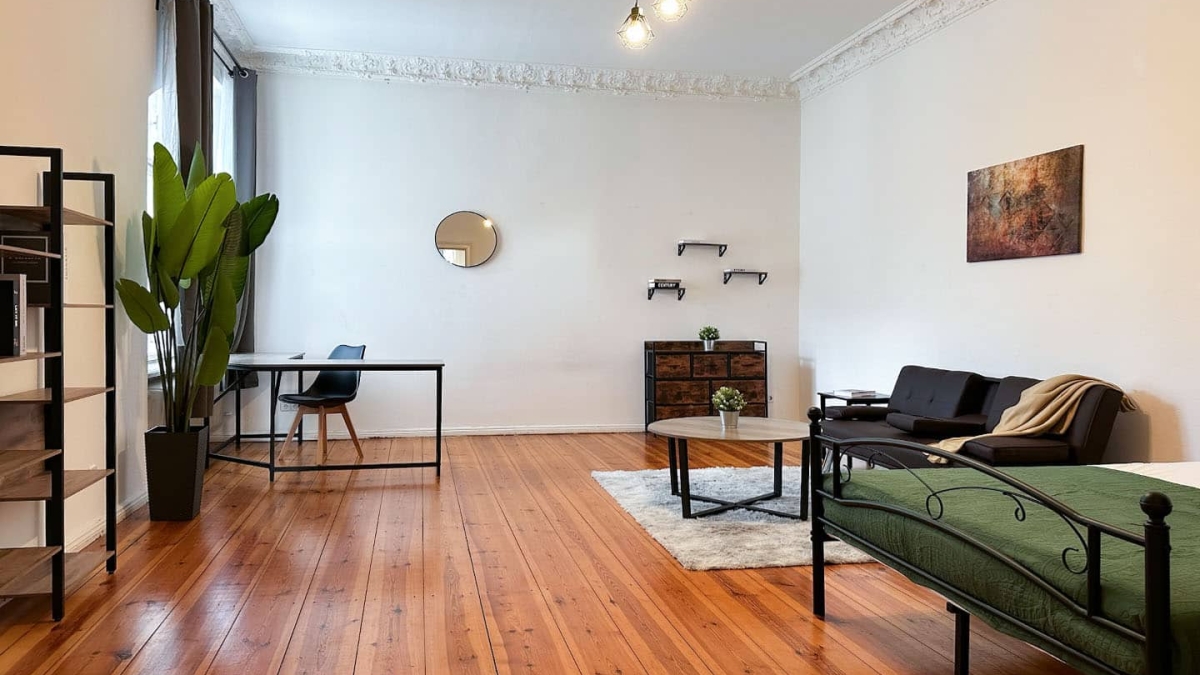Berlin, a top student city according to QS Best Student Cities 2024, draws many international students yearly. Finding accommodation in Berlin for international students is key when planning your stay. Monthly living costs range from €950 to €1,700, not including tuition. Your lifestyle affects these expenses, so it’s crucial to understand and budget for Berlin’s cost of living.
Accommodation in Berlin for International Students
Berlin offers various student housing options to fit different needs and budgets. While public universities often waive tuition for EU/EEA students, private universities charge more, with yearly fees averaging €10,500 to €49,000 for undergrad and postgrad studies. International students can work up to 20 hours weekly to help cover living costs. Despite being slightly pricier than the European average, Berlin remains an affordable Western European city.
Accommodation Options and Costs
When looking for accommodation for international students in Berlin, you’ll find many choices. Here’s a simple guide:
- Student Housing Options:
- Student Dorms: €350-€500 monthly. Great for first-years wanting basic amenities and new friends.
- Private Rooms: About €749 monthly. Offers both privacy and community.
- Studios: Around €1,154 monthly for those who like their own space.
- Student Apartments: About €1,680 monthly, good for sharing.
- Private Apartments and University Halls:
- Private Apartments: More privacy and better facilities, €900-€1,300 monthly.
- University Halls: Budget-friendly at €350-€500 monthly, with basic services and shared living.
- Extra Things to Think About:
- Utilities: Warm rent includes utilities, making budgeting easier. Cold rent lets you choose cheaper utility providers.
- Housing Benefit: In 2023, students might get about €370 monthly to help with utility costs.
Your choice of accommodation can really affect your costs and experience in Berlin. Think about your budget, how much privacy you want, and how close you need to be to your university.
Accommodation for International Students from KUMMUNI
Here’s a breakdown of the different student accommodation options offered by KUMMUNI:
- Private Rooms in Shared Apartments: Starting at €549, offering a blend of privacy and community.
- Studios: Starting at €860 for those preferring complete independence.
- Two-Room Apartments: Larger spaces costing starting at €1,300, suitable for sharing.
Additional benefits of choosing KUMMUNI:
- Affordable pricing: KUMMUNI offers apartments for rent in Berlin for students, presenting a budget-friendly alternative with costs ranging from €300 to €600 euros per month.
- Flexible leasing: Whether it’s short-term or long-term, KUMMUNI provides lease terms that adapt to the varying durations of student programs and internships, ensuring they can plan their stay without constraints.
- Zero-discrimination policy: KUMMUNI offers fair housing to all students, regardless of their background.
- Freedom to choose furniture: KUMMUNI allows students to choose their own furniture for their new apartment, free of charge.
If you are an international student looking for accommodation in Berlin, KUMMUNI is a great option to consider. Their variety of housing options, affordable prices, and flexible lease terms make them a good fit for any student’s needs.
Monthly Grocery Expenses
Managing grocery costs is a big part of living in Berlin as an international student. The city has lots of affordable shopping options that can help you save money. Here’s a breakdown to help you budget:
- Average Monthly Grocery Costs:
- Thrifty lifestyle: €150-€200
- Regular lifestyle: €200-€250
- Organic or specialty foods: Up to €300
- Money-Saving Tips:
- Discount Stores: Shop at Lidl, Aldi, and Netto for lower prices.
- Markets & Local Shops: Visit farmers’ markets or local bakeries and butchers for fresh, affordable food.
- Bottle Returns: Return bottles at grocery stores for discounts.
- Typical Prices:
- 1 liter of milk: €1.16
- 12 eggs: €2.85
- 1kg chicken fillets: €9.91
- 1kg apples: €2.58
- Bread from a local bakery: €1.69
Plan your meals, buy in bulk, and use discounts to keep your grocery costs down and make living in Berlin more affordable.
Getting Around Berlin
Berlin’s transport system is easy for international students to use, with lots of options to suit different needs. Here’s what you need to know:
- Getting Around Berlin:
- Monthly BVG Pass: For €32 monthly or less annually, enjoy unlimited bus, tram, and metro rides citywide.
- Student Travel Card: At €63, it’s a budget-friendly choice for frequent student travelers.
- Semester Ticket: Bundled with uni fees, this covers all Berlin ABC zones, simplifying student commutes.
- Budget-Friendly Alternatives:
- Cycling and Walking: Berlin’s bike-friendly streets and picturesque paths encourage eco-friendly, free transport.
- Car-sharing and E-scooters: For longer trips or special needs, these offer flexible, cost-effective options.
- Smart Saving Strategies:
- Student Perks: The School Student Ticket Berlin is free with a valid student ID, including free bike transport.
- Group and Advance Bookings: Save on group day passes or pre-booked tickets for out-of-city adventures.
Fun and Entertainment Costs
Berlin offers a wealth of affordable entertainment for international students. Here’s a guide to enjoying the city’s vibrant culture without overspending:
- Arts and Music Scene:
- Museums and Galleries: €5 – €20, with student discounts and free first Sundays at many venues.
- Live Music and Concerts: €10 – €50, with free shows like Berliner Philharmonie performances.
- Comedy Nights: Around €10, perfect for a laugh with friends.
- Social and Cinema Outings:
- Movie Tickets: About €12, less with student deals.
- Bowling: €16-€30, great for group fun.
- Eating Out: Meals range from €20-€30, drinks from €3-€9.
- Nightlife and Extra Savings:
- Club Entry: €8-€15, with many offering free entry or drink specials.
- Student Discounts: Always carry your student ID for savings on gyms, events, and more. Online services like Amazon Prime and Spotify offer student rates.
- Discount Apps: Use platforms like Groupon for activity and shopping deals.
Health Coverage and Insurance
For international students in Berlin, understanding healthcare and insurance is crucial. Here’s what you need to know:
- Insurance Options:
- Public Health Insurance: €90-€120 monthly, mandatory for most. Covers a wide range of services and is available to students under 30 in regular programs.
- Private Health Insurance: For students over 30 or in special programs. PROVISIT STUDENT plan costs €120-€200 monthly.
- Coverage Details:
- Both types typically cover medical treatment, prescriptions, preventive care, and emergencies. Public insurance includes pre-existing conditions, while private may not. Dental and vision care are partially covered.
- Enrollment Process:
- For public insurance, submit your university acceptance letter and residence permit. Some international students can use their home country’s insurance if it meets German standards. Check with your provider for eligibility.
Finding cheap accommodation in Berlin for international students is key to managing your budget. With careful planning and smart choices in housing, transport, food, and entertainment, you can enjoy all Berlin offers without financial stress. Remember, your student status often unlocks numerous discounts and benefits across the city.
Mastering Student Finances in Berlin: A Practical Guide
Navigating student finances in Berlin doesn’t have to be daunting. With smart planning, international students can enjoy a comfortable life without breaking the bank. Here’s how to make the most of your budget in Germany’s vibrant capital:
Monthly Expenses at a Glance
- Accommodation: On-campus (€600) or off-campus (€670)
- Transport: Public transit pass (€85)
- Food: Groceries (€24), eating out (€588)
- Utilities: Electricity (€80), internet (€10-€23)
- Extras: Clothes (€42), fun (€48), study materials (€20)
Money-Saving Tips
- Home Cooking: Cut food costs by preparing meals at home instead of dining out.
- Student Perks: Use your student ID for discounts on everything from museums to movies.
- Budget-Friendly Phone Plans: Choose a €7.99/month plan with 3GB data for basic needs.
- Track Spending: Use budgeting apps to keep your finances in check.
Earning Opportunities
- Part-Time Work: International students can work up to 120 full days or 240 half days yearly. Check university job boards or local networks.
- Financial Aid: Look into DAAD scholarships, Erasmus+ programs, and university-specific aid options.
By following these tips, you can manage your money well and focus on enjoying your Berlin adventure.
Life as an international student in Berlin is about balancing studies, finances, and fun. This guide helps you navigate costs for accommodation in Berlin for international students, transport, and daily living. By making smart choices about where to live, how to get around, and where to spend, you can make the most of your time in this exciting city.
FAQ:
What is the typical cost range for student housing in Berlin?
The average monthly cost for student accommodation in Berlin is between €500 and €1,300. Additionally, students should expect to spend about €250 per month on food and approximately €90 per month on transportation. Keep in mind that your overall living costs in Berlin will be influenced by your personal lifestyle.
How much does a typical accommodation cost in Berlin?
The cost of a typical accommodation in Berlin varies, but for students, it generally falls within the range of €500 to €1,300 per month, which includes the cost of rent and utilities.
What are the minimum living expenses for international students in Germany?
In Germany, the minimum living expenses for international students are estimated to be between 700 and 1,000 EUR per month. This includes the cost of accommodation as well as other expenses such as health insurance. Germany is known for its affordability and offers the opportunity to study for free, which can help to keep overall costs down for students.
Which area in Berlin offers the most affordable living options?
The Lichtenberg neighborhood is not only the safest but also the most affordable area in Berlin for living. The average rent in Lichtenberg is about €10 per square meter (unfinished, cold rent), making it an attractive option for those looking to save on housing costs.
How informative was this article?
Click on a star to rate it!
We are sorry that this post was not useful for you!
Let us improve this post!
What is missing in the article?















